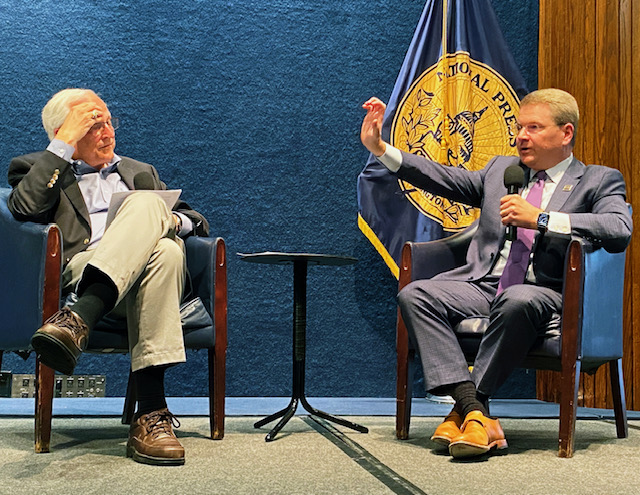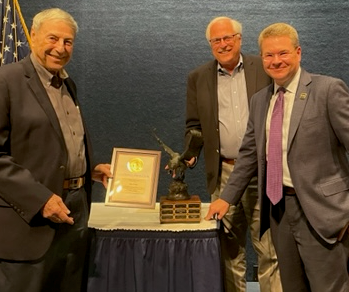CNN’s Feist regales Silver Owls Spring Hoot
The National Press Club’s Silver Owls awarded CNN Bureau Chief Sam Feist its coveted Order of the Owl award after he regaled the Owls’ Spring Hoot.
He told about his encounter with President Donald Trump on the morning after his inauguration when he was called to the White House because CNN had run a small story that morning saying the crowd for Trump’s inauguration was smaller than for Barack Obama’s first inaugural. Trump would not believe the aerial photos the networks had taken at the same time for each event.
Even after Feist showed Trump’s team aerial photos showing the difference in crowd size, the new president refused to believe it. Trump’s protests made a nothing story into big story that lasted for days, Feist said. It also helped lead Trump to condemn CNN as the primary “enemy of the people” for his entire administration.

Feist joined CNN in 1990 and has been Washington bureau chief and senior vice president for 12 years. He has been responsible for producing most of CNN news programs in Washington and directing much of its national and international coverage, including sending news crews to the hottest conflicts in the world. He has also served on the board of the Club’s Journalism Institute, helping to direct and raise money for the nonprofit arm working on journalism education and press freedom.
The Silver Owls are comprised of Club members of more than 25 years, and it holds two events each year. The Order of the Owl award was presented by Frank Aukofer, the Club’s 1978 president and one of the long-time organizers of the Silver Owls.
Aukofer said that the award was given to people who have contributed to journalism or to the Club.
“You, Sam, fit both of these,” he said. “Your role of shaping CNN’s coverage in Washington and around the world for so long may be peerless. But you also have played a key role with the Club’s Journalism Institute as a member of its board, helping us shape our journalism education and press freedom initiatives.”
While the recent CNN New Hampshire town hall with Trump has been widely criticized, Feist said that the network has a long tradition of airing town halls with major candidates during the lead up to the election. He said Trump’s performance may be a harbinger of what to expect as the primary season develops.
Feist said he does not consider Fox News a competitor because the two have completely different business models. CNN attracts more online visitors than any other news organization, he said. That makes his competitors other news organizations with an international reach such as The New York Times, The Washington Post and the broadcast networks.
With hundreds of journalists reporting from dangerous places around the world, CNN must not only maintain an outsized budget for news gathering, he said, but it also must take great precautions to assure that those journalists are safe, even while reporting in war zones such as Ukraine.
Calling presidential elections
One of Feist’s jobs is to make the decision to call each state during a presidential election. No other democracy depends on the news media to announce who won an election, he said. The pressure in 2020 was terrific, he said, when he held off calling Arizona’s returns as Biden’s lead shrunk. The next election could be just as bad.
But he said he had confidence that the election process will be fair and cannot easily be manipulated once the votes are cast.
His role, however, got the attention of the developers of the hit HBO show “Succession.” He said he was invited to the production of a episode involving the election night at a “Fox News-like” cable network called ATN News as a consultant on how the process works in real life. He was even offered a cameo appearance, which he declined.

Feist is known as a great admirer of Edward R. Murrow. Asked what he would say to Murrow if he somehow could meet him now. His answer was poignant and not expected.
He said his great grandfather was interned at Buchenwald, the Nazi concentration camp in eastern Germany. Somehow, he escaped and made his way to the United States, but many relatives and friends didn’t make it out.
His grandfather, who left Germany in 1935, joined the American army, and when Buchenwald was liberated, he was sent there because he spoke fluent German. Just days later, Murrow showed up and did a factual account of what he saw and what had happened there.
With so many people around the world in disbelief and denial of the Nazi atrocities, he said, his grandfather realized how important having a journalist of Murrow’s stature in the United States revealing what had happened.
